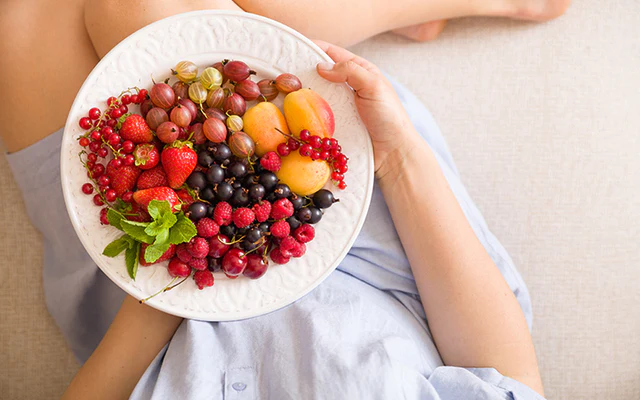Without a doubt, skincare has progressed greatly, and now there are a plethora of options for achieving the healthiest, most radiant, and most youthful-looking skin conceivable. But if you don’t take care to nourish your skin from the inside out, there is little purpose in wasting money on what you put outside on the skin, and let’s face it, you may spend a tiny fortune on such items.
The foods you eat can have a major effect on your skin’s appearance and texture, as well as on your chance of developing common skin disorders and skin cancer.
There isn’t one miracle food that does wonders for your skin. The best method to maintain healthy skin is to consume a plant-based diet with occasional servings of oily fish.
- Avocados
Because of the elastin and collagen in your skin, it is elastic and resilient. They improve skin’s elasticity. However, your body will create less of them as you become older. This happens as a normal consequence of getting older. Avocados, however, are loaded with heart-healthy lipids that help mitigate this effect.
iExperts have done several researches to prove that healthy diets are essential to help maintain firm, youthful skin. Additionally, avocados protect your skin from the sun’s damaging effects.
- Flax seeds
Flax Seeds are enriched with the omega-3 fatty acid alpha-linolenic acid.
Quickly increasing intake of skin-beneficial omega-3 fats, fresh flax seeds ground into a smoothie or sprinkled over a salad, is one option.
Researchers in 2011 showed that sensitive-skinned women who took a flaxseed oil supplementation for 12 weeks showed improvements in several areas:
- greatly reduced abrasion
- lowered scaling improved hydration
- smoother skin
- Berries
A wide variety of berries, including blueberries, blackberries, cranberries, and the mighty goji berry, are rich in antioxidants and nutritional value. The anti-inflammatory properties of antioxidants make them ideal skin care products since they help the body recover itself while also shielding it from further free-radical damage. These are full of vitamins A and C which work as antioxidants.
4.Omega-3 fatty acids
In addition to lowering cholesterol, omega-3 fatty acids also reduce inflammation. In addition, they assist in the maintenance of collagen in the skin, which contributes to its resilience. Some of the best skin specialists argue that fish is the best place to get omega-3s. The top candidates for the position are as follows.
- Herring.
- Mackerel.
- Salmon.
- Tuna
- Sardines.
- Kiwi
Collagen, the protein responsible for your skin’s suppleness, is produced in large part due to vitamin C’s help. Wrinkles form as a result of collagen breaking down with age; however, one kiwi, which contains 141% of your recommended dose of vitamin C, can help delay this process.
- Green Tea
Green tea helps the body eliminate waste products and improves skin tone and texture. Damage from the sun and pollution can be repaired using this.
This tea has well-known anti-inflammatory properties, green tea has been shown to help protect cell membranes. Several studies suggest that consuming green tea may help reduce exposure to harmful ultraviolet radiation from the sun, potentially lowering the risk of skin cancer. Polyphenols and antioxidants (substances that reduce inflammation) are particularly abundant in them, making them a good choice for skin health.
- Yogurt
Yogurt is not only a satiating snack due to its high protein content, but it also has several health benefits thanks to the bacteria it contains. Inflammation is a major contributor to the development and progression of many skin diseases, including acne, contact dermatitis, and psoriasis; probiotics, being live, friendly bacteria, help combat this inflammation. Increased skin hydration and less skin sagging are two additional benefits of probiotic use. Kefir, kombucha, and sauerkraut are a few other examples of foods that contain probiotics.
- Tomatoes
Tomatoes get their vibrant red color from carotenoids like lycopene, which are also found in abundance in these delectable foods. Tomatoes’ combination of beta carotene, lycopene, and lutein can help shield skin from UV rays and may even keep wrinkles at bay.
- Grapes
Anti-oxidant chemicals ellagic acid and resveratrol are found in all three types of grapes (green, red, and black). Scientists have discovered that a two-week diet of grapes can provide protection from UV rays. The study concluded that it takes much more UV exposure to develop sunburn after consuming grapes.
- Cucumber
In terms of appearance, cucumbers are among the best. Their effects on the skin are nothing short of remarkable. Cucumber juice has a soothing and illuminating effect on the skin.
The anti-inflammatory properties of cucumber also make it an effective natural skin lightener. Wrinkles and fine lines are diminished as well.
- Olive oil
Olive oil, which is rich in antioxidants and vitamins like vitamin E and vitamin K, is another tasty way to combat inflammation. Vitamin E’s antioxidant properties make it useful for preventing sun damage and skin cancer. Vitamin K aids blood clotting and has a role in calcium homeostasis. This means less puffiness and improved overall healing for the skin.
Conclusion
You can’t have beautiful skin by eating a single “superfood” or “magic food” every day. The idea of “flawless skin” is a bit of a pipe dream, with wrinkles, acne, and uneven pigmentation all being part of the game.
Still, you can boost your skin’s beauty by incorporating healthy foods. Consult your dermatologist in Karachi to learn more about the skin benefits of these foods for you.
FAQs
- To what extent do different diets affect skin color?
Get at least 3.5 more servings of carrots, yams, plums, dark leafy greens, or tomatoes every day for the next 6 weeks. This rise is adequate to induce a visible shift in skin color.
- What kind of food promotes youthful skin?
Skincare is improved by eating fatty seafood like salmon, mackerel, and herring. They have a high concentration of omega-3 fatty acids, which are useful for keeping skin in good condition. For healthy, thick, and hydrated skin, omega-3 fatty acids are a must.
- How may skin elasticity be improved by eating certain foods?
Skin elastin can be restored by eating foods like greens, fatty fish, citrus fruits, broccoli, almonds, and walnuts. You can expect to see visible results from these nutrients on your skin from the inside out.






